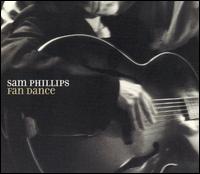
Sam Phillips
Fan Dance (Nonesuch)
by Marc Hirsh

Sam Phillips
Fan Dance (Nonesuch)
by Marc Hirsh
originally published in Space City Rock, Fall 2002
Even though they’re kinda the same album if you squint your ears hard enough,
I greatly prefer Fan Dance to Joe Henry’s Scar, and I’ll admit
flat out that this is probably because Sam Phillips is a woman. I am, and
have been for a long time, hardwired to respond to female voices in ways
that just doesn’t happen with men. Sure, I can appreciate great singers regardless
of gender, but that pesky double-X vocalizing goes deeper than that for me,
to a place where justification sometimes becomes tricky and very possibly
moot. And so we have the lovely and ofttimes remarkable Fan Dance
, which tunnels so far below my radar that it ultimately nestles in some
subverbal cove in my brain. Try though I might to explain it, I run the very
real risk of coming across as a gibbering moron.
Before I start rhapsodizing about how Phillips looks like the middle
ground between Helen Mirren and Emily Watson, then, I’ll try to compose
myself and suggest that Fan Dance indicates what happens when a fine
and nuanced pop singer opts to work from decidedly non-pop frameworks and
styles. The last I’d heard from Phillips was in 1994, when the straightforward,
poppish “I Need Love” enjoyed a too-brief run on discriminating radio stations,
throwing Martinis and Bikinis onto my to-buy list, where it remains
to this day. Fan Dance, on the other hand, can be jarring at times
and not merely in the context of that song, which might as well have come
from another planet (that is, ours). “Edge of the World” is gothic oompah,
“Wasting My Time” is the sound of three cellos gasping for air and what few
songs don’t dispense with percussion altogether (such as the spare and gorgeous
“Love Is Everywhere I Go”) are backed by drums so rudimentary that they
barely register.
It’s when Phillips opens her mouth that everything holds together and
such distinctions seem petty and ignorant. “Nostalgia isn’t what it used
to be,” she avers in “Taking Pictures,” and the slightly facile sentiments
(deep enough to make a catchy bumper sticker, but little more) are utterly
transformed by a voice that sounds like honey pouring through molasses,
tugging on the words until their literal meaning is completely superceded
by the sound of a woman dripping syllables into your subconscious. It’s
a voice that I’d listen to recite the five Ws, and Phillips so clearly knows
it that she gives us “Is That Your Zebra?” just to show off. In tandem with
the stark but oddly warm instrumental backdrop, the result is what Robert
Christgau calls “googlefritz” (although I notice that he failed to find
it here), which is to say that at its most truly fundamental level, music
is nothing more or less than magic, or mathematics, neither of which I purport
to be able to explain. But I know them when I hear them.